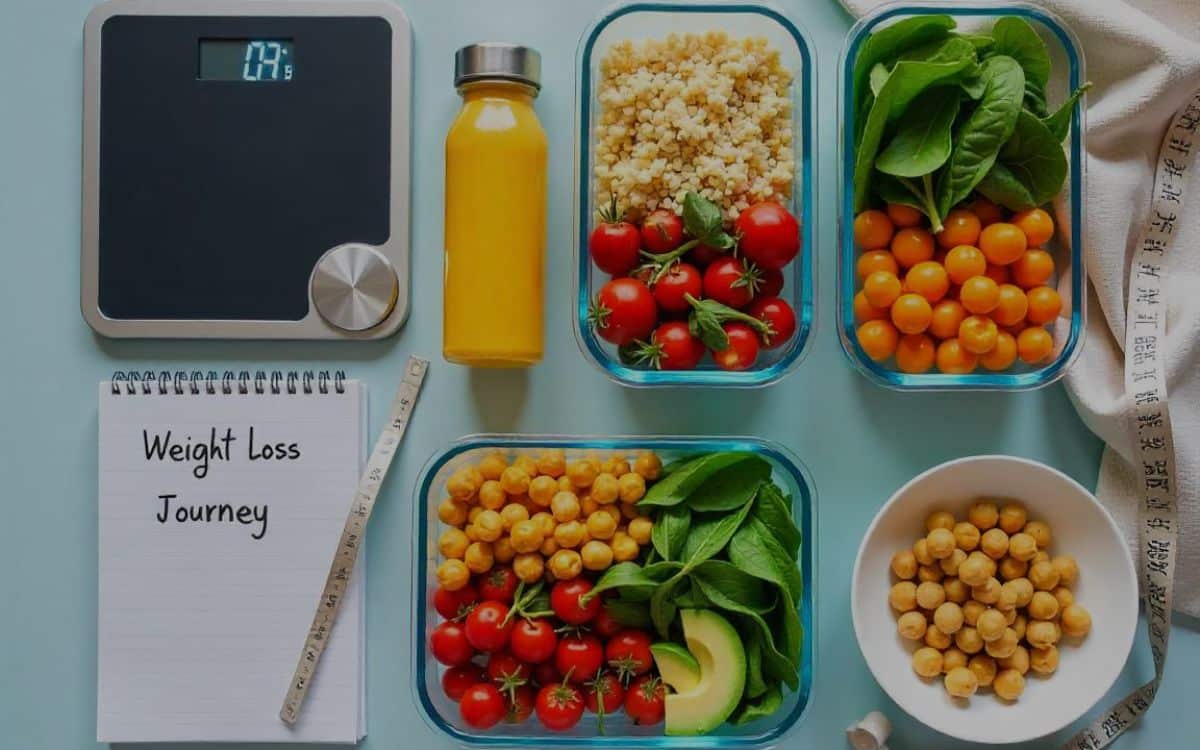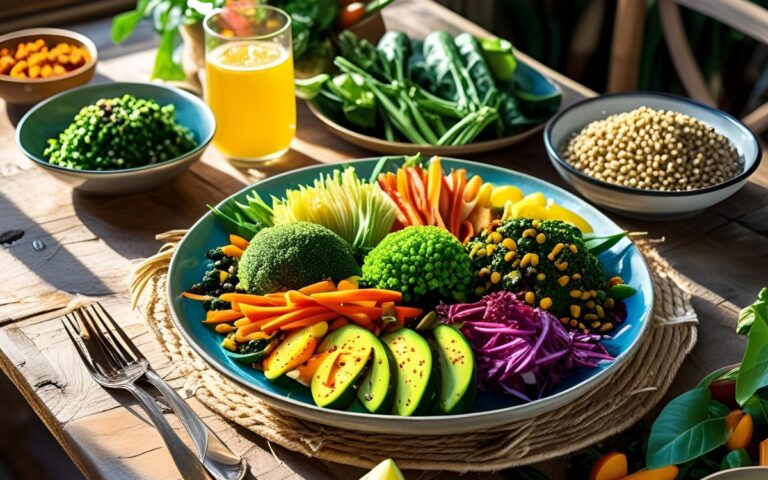Plant-Based Diet for Weight Loss: Shed Pounds Naturally
Plant-based diets have gained popularity for their health benefits. They can also aid in weight loss.
This diet focuses on consuming foods derived from plants. Think fruits, vegetables, grains, nuts, and seeds.
People turn to it for various reasons. Some seek to improve their health. Others want to lose weight naturally. A plant-based diet offers a sustainable way to shed pounds.
It promotes nutrient-rich, low-calorie foods. These foods keep you full longer. Unlike restrictive diets, it encourages a balanced approach.
You eat a variety of foods. This ensures you get essential nutrients. It’s more than just salad. You can enjoy hearty meals and tasty treats.
Adopting this diet can change your eating habits for the better. It’s about making long-term lifestyle changes.
Key Takeaways:
Expert Guidance:

Benefits Of Plant-based Diets
Plant-based diets aid weight loss by emphasizing fruits, vegetables, and whole grains. These foods are low in calories and high in fiber, keeping you full longer.
Eating plant-based meals can reduce calorie intake while boosting metabolism naturally.
Switching to a plant-based diet isn’t just a trendy choice; it comes with a host of benefits that can significantly impact your health and the world around you.
Many people find that embracing a diet rich in fruits, vegetables, and whole grains not only helps shed unwanted pounds but also boosts overall well-being. Have you ever wondered how a plant-based diet could transform your lifestyle?
Nutritional Advantages
A plant-based diet is packed with essential nutrients. By focusing on whole foods, you naturally increase your intake of vitamins, minerals, and antioxidants.
These nutrients are crucial for maintaining a healthy immune system and reducing inflammation.
Whole grains, legumes, and nuts provide the body with ample fiber. Fiber aids digestion and promotes a feeling of fullness.
This can be particularly beneficial for those looking to manage their weight. Switching to plant-based proteins like beans and tofu can also lower cholesterol levels.
This simple change can improve heart health and reduce the risk of chronic diseases.
Environmental Impact
Eating more plants can be a small step with a huge impact on our planet. Animal agriculture is a leading cause of deforestation and greenhouse gas emissions.
By choosing plant-based options, you help reduce your carbon footprint. Imagine the difference if everyone reduced their meat consumption by even a small percentage.
The cumulative effect could lead to significant environmental improvements. Plant-based diets also use fewer natural resources.
Growing plants for food requires less water and land compared to raising animals. This means your dietary choices can contribute to a more sustainable future.
Have you experienced a personal shift in perspective after learning about the environmental benefits of plant-based diets?
It’s empowering to know that your everyday choices can contribute to a healthier planet.
Embracing a plant-based lifestyle isn’t just about losing weight; it’s about gaining a healthier body and a cleaner environment. What changes will you make today?
Weight Loss Mechanism
Plant-based diets are popular for their health benefits. They help with weight loss too.
Understanding the weight loss mechanism is key. This diet is rich in fruits, vegetables, and whole grains.
These foods are low in calories but high in nutrients. They fill you up without adding extra pounds. Let’s explore why plant-based diets aid weight loss.
Caloric Density
Caloric density refers to the number of calories in a given weight of food. Foods with low caloric density have fewer calories per bite.
Plant-based foods often have low caloric density. This means you can eat more without consuming too many calories. A bowl of fruits or vegetables can be very filling.
Yet, it won’t increase your calorie intake much. By choosing low caloric density foods, you manage hunger better. It helps in reducing overall calorie consumption.
Fiber Content
Fiber is a key component of plant-based diets. It aids weight loss by promoting fullness.
High fiber foods take longer to chew and digest. This slows down the eating process. It helps you feel full for longer periods.
Fiber also regulates digestion and prevents overeating. Most fruits, vegetables, and grains are rich in fiber.
By boosting fiber intake, you reduce calorie absorption. This supports weight loss effectively.
Essential Nutrients
A plant-based diet can be a healthy way to lose weight. It focuses on whole foods like fruits, vegetables, grains, nuts, and seeds.
But, ensuring you get all essential nutrients is crucial. This diet can provide everything your body needs. You just have to know where to look.
Protein Sources
Protein is vital for muscle repair and growth. It also keeps you full longer. Lentils, chickpeas, and beans are excellent sources.
Tofu and tempeh are great too. Quinoa offers complete protein, containing all essential amino acids.
Don’t forget about nuts and seeds. Almonds, chia seeds, and hemp seeds are rich in protein. These options provide variety and taste to meals.
Vitamins And Minerals
Vitamins and minerals support body functions. Leafy greens like spinach and kale are rich in vitamins A, C, and K. Sweet potatoes are full of vitamin A. They also have fiber, which aids digestion.
Minerals like iron and calcium are essential. Fortified plant milks and cereals can provide them.
Beans and lentils offer iron. Pair them with vitamin C-rich foods for better absorption. Almonds and broccoli are good calcium sources.
Meal Planning Tips
Explore simple ways to plan plant-based meals for weight loss. Focus on balanced portions and diverse vegetables. Prioritize whole grains and proteins like beans or tofu for satisfying dishes.
Switching to a plant-based diet for weight loss is a fantastic choice, but meal planning can be the game-changer in your journey.
Imagine walking into your kitchen and knowing exactly what to cook without the stress of guessing if it fits your dietary goals.
Meal planning ensures you’re prepared, prevents impulse eating, and helps you maintain a balanced diet.
Let’s dive into some tips that will make your plant-based meal planning both practical and enjoyable. ###
Balancing Macronutrients
Maintaining the right balance of macronutrients is crucial. While plants are naturally rich in carbs, you need to ensure you’re also getting enough protein and healthy fats.
Think about including beans, lentils, and tofu in your meals for protein. Add nuts, seeds, and avocados for healthy fats.
A simple way to balance macronutrients is by creating a table with three columns: carbs, proteins, and fats.
List your favorite foods under each category. This way, when you’re planning meals, you can easily mix and match to ensure a balanced plate. ###
Incorporating Variety
Eating the same meals can lead to boredom and potential nutrient deficiencies. A diverse diet keeps your taste buds happy and ensures you get a wide range of nutrients.
Challenge yourself to try a new vegetable or grain each week. This keeps meals exciting and gives you a richer nutritional profile. Create a list of seasonal produce and rotate them weekly.
This not only keeps your meals fresh but also saves money. You might discover a love for foods you’ve never tried before, like quinoa or bok choy. How do you ensure variety in your meals?
Share your ideas in the comments below and let’s build a community of diverse eaters.
By focusing on macronutrient balance and variety, you’ll find meal planning becomes less of a chore and more of an enjoyable part of your plant-based journey. Get excited about your next grocery trip!
Overcoming Challenges
Adopting a plant-based diet for weight loss presents unique challenges. Many face hurdles in understanding and implementing this dietary change.
Success requires addressing common misconceptions and social barriers. Understanding these challenges can lead to a smoother transition.
Common Misconceptions
Many believe plant-based diets lack protein. This is not true. Lentils, beans, and tofu offer ample protein.
Some think plant-based meals are bland. Use herbs and spices for flavor. Another myth is that plant-based diets are expensive.
In reality, grains and vegetables are affordable staples. These misconceptions can deter many from trying. Educating oneself is crucial for overcoming these myths.
Social And Cultural Barriers
Social situations often challenge plant-based eaters. Friends might question dietary choices. Family gatherings may lack plant-based options.
Cultural traditions often center around meat dishes. Navigating these scenarios requires preparation and communication.
Suggest bringing a dish to share. Explain dietary choices kindly. Over time, social circles might become more understanding. Building a support network helps immensely.
Success Stories
Success stories are powerful. They inspire and motivate others on a similar journey. A plant-based diet has changed many lives.
People have shared their weight loss stories. These transformations highlight the benefits of plant-based eating. Real-life experiences can guide others to choose healthier paths.
Inspiring Transformations
Many individuals have shared their success with plant-based diets. Emma lost 50 pounds in a year. She felt more energetic and happy.
Tom switched to plant-based and shed 40 pounds. His blood pressure improved significantly. These stories show the positive impact of plant-based diets.
Maria, a mother of two, lost 30 pounds. She found new vitality for playing with her kids. Her story encourages others to make a change. These transformations are not just about weight. They also speak of improved health and well-being.
Expert Endorsements
Experts also support the benefits of plant-based diets. Dr. Smith, a nutritionist, praises their health benefits.
She notes improved heart health and reduced obesity risk. Dr. Lee, a wellness coach, recommends plant-based diets for weight management. He highlights their role in sustaining long-term health.
Nutritionists emphasize the importance of whole foods. They advocate for fruits, vegetables, and grains.
Experts agree that plant-based diets are beneficial. Their support adds credibility to these success stories.
Conclusion
A plant-based diet helps with weight loss. It focuses on whole foods. Vegetables, fruits, and grains fill your plate.
These foods are low in calories. They are also rich in nutrients. You feel full longer. Less snacking. More energy. Simple lifestyle changes lead to better health.
You enjoy varied, tasty meals. No strict rules. Just mindful eating. You support a sustainable planet too.
Weight loss becomes easier. Healthier choices become a habit. Embrace this journey. Feel the benefits. A plant-based diet offers a path to wellness.
Try it today. Feel lighter, healthier, happier.






